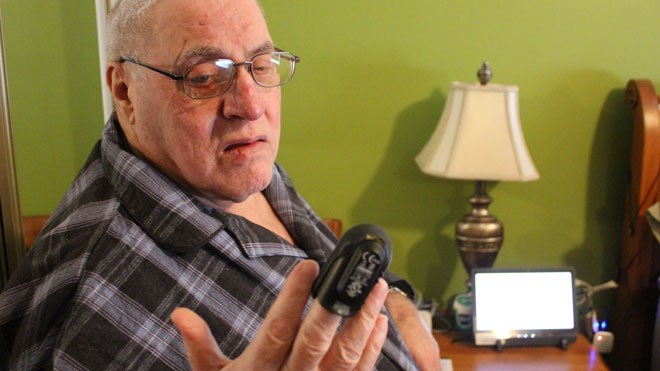For the past two years, it has been difficult for John Mealey to even fetch his mail down the road.
“Some days I can't get my own socks on,” said Mealey, who was diagnosed with chronic obtrusive pulmonary disease.
Mealey said his smoking habit, and a 26-year career as an underground miner for Inco, contributed to the disease.
Chronic obtrusive pulmonary disease is caused when mucus blocks the breathing tubes that carry air in and out of a person's lungs. The symptoms include a long-lasting cough, coughing up mucus, and being short of breath.
In addition to his lung problems, Mealey had heart failure, and underwent open-heart surgery when he was 48. He is now 72.
To help manage his chronic ailments, Mealey has become an early user of the Community Care Access Centre's telehomecare program.
The program started 20 months ago, and allows patients to remain in regular contact with a registered nurse from their homes.
Patients are outfitted with a specialized tablet that allows them to report on their symptoms, their overall health and medication usage.
In addition to the tablet, Mealey was provided with a scale, a blood pressure monitor and an oximeter, which measures his oxygen levels.
Once a week, Mealey speaks with his nurse, Chantal Larochelle, over the phone, and brings her up to speed on his symptoms and progress.
Based on his feedback, Larochelle can make recommendations and help Mealey manage his health.
If Mealey says he has gained weight, for example, Larochelle can recommend he changes the doses for his medications.
“When the weight goes up for somebody with heart failure it might mean they're building up fluid, which isn't good for their heart,” Larochelle said.
Larochelle said the telehomecare program has allowed her to interact with more patients than she could if she travelled to each of their homes to meet them in person.
She has a list of around 30 patients she monitors on a weekly basis. The telehomecare program lasts for six months, and is meant to teach patients the skills they need to self-manage their conditions.
Mealey also relies on his wife, who is his primary caretaker, and a personal support worker who visits him on a regular basis to check on him.
He said the telehomecare program has helped him regain a bit of independence by providing him the information he needs to better manage his health.
“It keeps me in touch with my nurse,” he said. “If I need any information, or have any questions about my pills, I call her.”
@jmigneault
